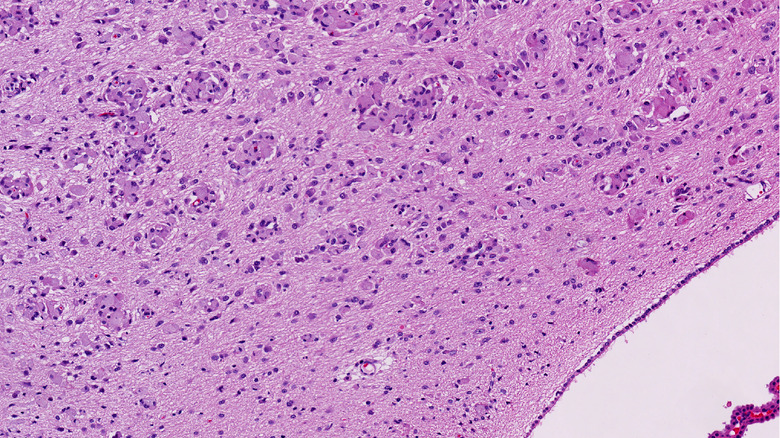Why Is Krabbe Disease So Prevalent In The Middle East?
When Afroz and Naveed Shehzad took their daughter Amirah to the doctor at 6 months old, her physicians diagnosed her with the rare genetic disorder called Krabbe's disease, according to The Sun. One of only eight children in the U.K. with the genetic disorder as of 2021, doctors originally told Afrox and Naveed that children with this disease, which causes progressive neurological degeneration, usually do not make it past their second birthday.
Affecting one in every 100,000 newborns in the U.S. and Europe, Krabbe's disease has been reported in similar cases in Oregon and also in Australia. Sadly, there is currently no cure for Krabbe's disease, although children who develop the disorder later in life tend to have a better prognosis and chance of survival, per Mount Sinai. (One Wisconsin family who lost their first child to Krabbe's disease credits a genetic screening test with saving the life of their next child born with the disease, per Fox News).
But as researchers increasingly focus attention on the life-threatening disease, more data has illuminated that certain groups may more commonly develop it, including people in the Middle East.
What is Krabbe disease?
Krabbe's disease is caused by a genetic mutation in the gene galactosylceramidase (GALC), according to News 9. The absence of this gene causes a lipid called psychosine to build up in the brain, which can destroy cells and lead to paralysis, intellectual disability, blindness, and deafness, according to National Organization for Rare Disorders. Children may present with slow development, seizures, or hyperirritability within the first seven months of age, during which 90 percent of cases are diagnosed, per Rare Diseases.
If both parents carry the mutative copy of the gene, their children have a 25 percent chance of inheriting the disease; a 25 percent chance of inheriting the normal copy of the gene; and a 50 percent chance of inheriting just one mutated copy — which would make them future carriers of the disorder if they chose to have children but would not result in the disease itself presenting, per News9.
Middle Eastern prevalence
Although the rate of diagnosis for Krabbe's disease is about one in every 100,000 live births in Europe and the U.S. combined, the prevalence of the diagnosis differs by country, according to an article in the Journal of Pediatric Genetics. For example, Krabbe's disease is relatively commonly diagnosed "in the Muslim Arab population in Israel, with a very high prevalence" of between one in every 100 and one in every 150 live births. That's roughly 1,000 times more common than the rate of diagnosis in the total U.S. and European populations.
According to the article in the Journal of Pediatric Genetics, this could be because some nations in the Middle East marry consanguineously or within the family. In two villages in Israel with these cultural practices, for example, the number of parents who carried these genes was higher than the rate of the overall population at nearly 17 percent (via Journal of Pediatric Genetics). The situation is made more complex because different mutations have been found across different populations.
Potential cures
Sadly, there is currently no cure for Krabbe's disease, and children with the disorder are usually treated with supportive and palliative care, per National Organization for Rare Disorders. However, as scientists understand the genetic mutations that are causing the disorder better, new experimental therapies are emerging.
About 30 percent of children with Krabbe's disease who receive a bone marrow transplant in their first month can prevent new symptoms from developing, but the procedure is "exceedingly risky," per Science Daily. Another experimental treatment is enzyme replacement therapy, in which the missing molecules in Krabbe's disease are therapeutically injected, according to an article in Frontiers in Medicine.
According to Mount Sinai, parents can get a genetic screening test before having children to determine whether they carry the gene for Krabbe disease, and prenatal tests can be performed once a family is pregnant to see whether the child has developed Krabbe's disease. However, as Dr. Hatem Zayed, the author of the article in the Journal of Pediatric Genetics, writes, understanding the prevalence of this disease "in the Arab world is challenging due to the paucity of reports, the rarity of the disease, and the undeveloped infrastructure for genetic screening in the 22 Arab states."



